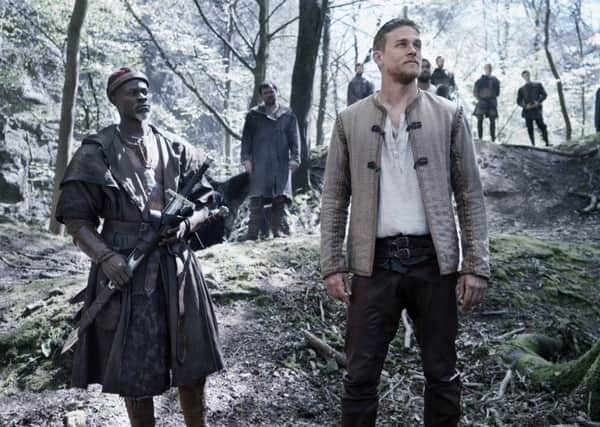Film reviews: King Arthur: Legend of the Sword | Colossal | Snatched


King Arthur: Legend of the Sword (12A) **
Colossal (15) ***
Snatched (15) **
Having successfully turned his hand to big budget franchise filmmaking with his two Sherlock Holmes movies (and then promptly blown his box-office cachet with the underperforming Man from U.N.C.L.E. reboot), Guy Ritchie takes on the legend of Camelot and re-tools it here as a geezer action movie. Pitched somewhere between Lock, Stock and Two Smoking Barrels, Game of Thrones and Lord of the Rings, King Arthur: Legend of the Sword is another mishmash of occasionally interesting visual ideas, convoluted plotlines and lots of meaningless narrative trickery – all of which prevent the film from ever gaining traction. The result is an inert origins story – the cinematic equivalent of Excalibur before Arthur gets his hands on it.
An elaborate CGI-heavy prologue sets up the magic-and-myth-heavy story. Despite being somewhat incomprehensible, the basic idea is that the young Arthur is smuggled out of Camelot, Moses-style, after his royal father King Uther (Eric Bana) is betrayed by his evil brother Vortigern (a hamming-it-up Jude Law). Oblivious to his birthright, Arthur grows up a streetwise vagabond in the back alleys and brothels of nearby Londinium. Ritchie powers through all this backstory in a matter of minutes with a speeded-up montage that brazenly and entertainingly cuts to the chase in order to introduce us to the adult Arthur, played by Charlie Hunnam, who’s something of a wheeler-dealer and local fixer, hanging out with a crew of sketchy associates with names like Back Lack (Neil Maskell), Wet Stick (Kingsley Ben-Adir), Chinese George (Tom Wu) and Goose Fat Bill (Aiden Gillen).
Advertisement
Hide AdSadly, Ritchie’s more idiosyncratic flourishes don’t gel at all with the demands of delivering a mega-budget epic (this reportedly cost $175m). As Arthur is randomly captured and brought to a quarry to try his hand at pulling Excalibur from its stone, what should be a pivotal moment in the film is undercut by a cameo from David Beckham, who turns out to be no Vinnie Jones. It’s a terrible scene and the film never really recovers. With Arthur forced into the role of the reluctant hero, Ritchie’s attempts to have fun with his roguish, laddish characters conflicts with the story’s need to mould Arthur and his associates in a way that will justify the finale’s presumptive sequel set-up (let’s just say a round table is involved). The film’s epic intentions also mean Ritchie struggles to reconcile the demand for spectacle with his own sensibility. Instead of injecting his personal filmmaking style into the gargantuan battle sequences, he seems content to let them unfurl in the blandly anonymous style of any other summer blockbuster with a large effects budget. Unfortunately, the tricks he deploys elsewhere to inject some personality into this do seem awfully tired. Aside from that aforementioned introductory montage and a chase sequence shot entirely in close-up, he keeps falling back on the same technique of delivering the conclusion of a sequence first, then using sleight-of-hand editing to rewind the action to show how events really unfolded. It becomes boring and redundant. For all his technical ability, Ritchie really doesn’t appear to have evolved much as a filmmaker in the last 20 years.
The raging, monstrous id of a self-loathing, emotionally destructive alcoholic is given an intriguingly literal twist in Colossal, a genre-bending redemption comedy/drama in which Anne Hathaway’s downward-spiralling 30-something discovers her calamitous emotions are manifesting themselves in the form of a Godzilla-like creature rampaging around South Korea. Written and directed by talented Spanish filmmaker Nacho Vigalondo, who made the excellent Time Crimes and flirted with a similar relationship drama/disaster movie hybrid in his follow-up film Extraterrestrial in 2011, the film kicks into gear when Hathaway’s unemployed internet journalist Gloria is dumped by her boyfriend (Dan Stevens) after spending yet another night out partying. Returning to her hometown in order to sort out her life, she seems to find salvation in the form of Oscar (Jason Sudeikis), an old school friend who offers her a part-time job in his recently inherited bar. But when she awakens from yet another blackout to news reports that an actual monster has appeared out of thin air to terrorise the city of Seoul, it slowly dawns on her that she’s the cause. How and why are plot points that shouldn’t be revealed here – suffice to say that while the film mines the obvious metaphors for all they’re worth, it has some surprises in store. On the downside, it does skirt around the issue of its protagonist’s misery causing countless deaths on the other side of the world (or to be fair, it acknowledges this conceptual problem, but doesn’t resolve it in a way that’s entirely satisfying). Nevertheless, Hathaway and Sudeikis are both good enough to carry the film, with the former riffing on her excellent performance in Jonathan Demme’s Rachel Getting Married and the latter subverting his de facto nice guy appeal in ways that are surprisingly dark and disturbing.
There’s more monstrous behaviour in Snatched, a comedy vehicle for Amy Schumer that never quite manages to be funny, despite a script by The Heat’s Katie Dippold and a starring role for Goldie Hawn. Schumer plays another trainwreck character (see her character in, erm, Trainwreck) who this time takes her overly cautious mother (Hawn) on holiday to Ecuador and promptly ends up getting kidnapped. Slackly directed by Jonathan Levine, the film pays only cursory attention to its plot and fails to harness the considerable appeal of Schumer and Hawn along the way.